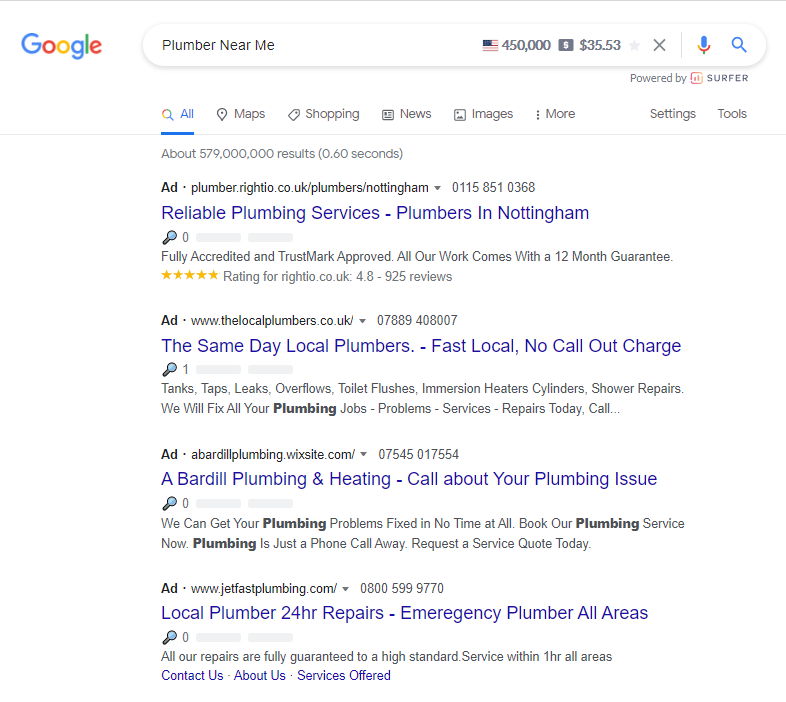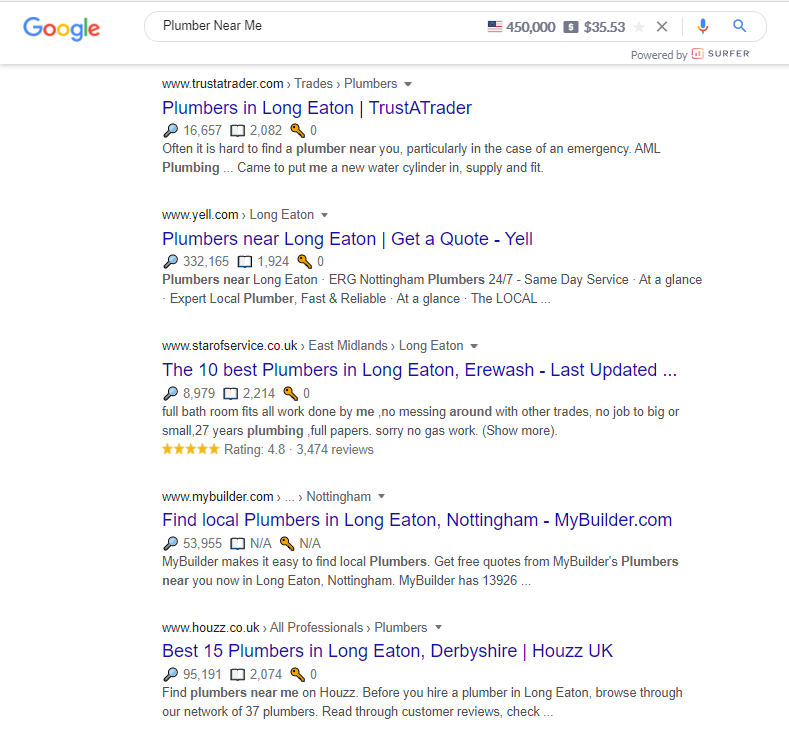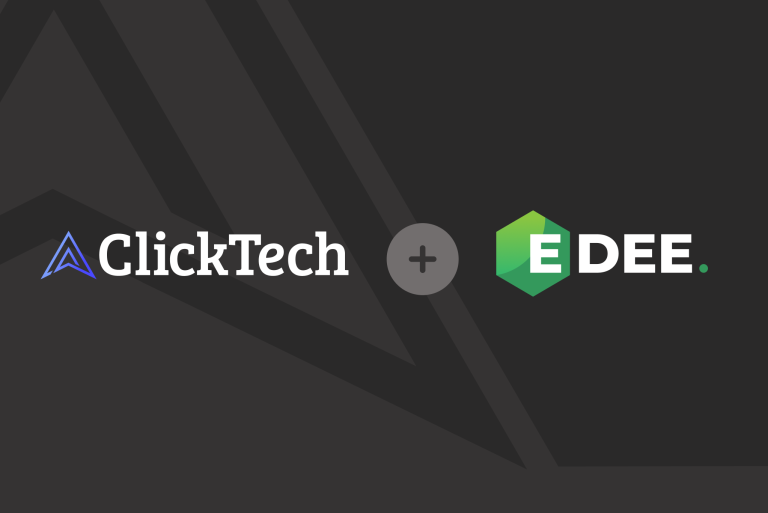As a business owner trying to formulate the most effective marketing strategy for your company, a question you may be asking yourself is: “Which is better: SEO or PPC?”.
In short, the answer is that it depends on factors such as your company’s content output and platforms used, the product or service you are selling, and your overall marketing and business objectives.
In many instances, PPC and SEO can actually complement each other and work together to drive traffic in their own way, which we’ll explain later on.
This article will cover the key differences between PPC and SEO, what they are and why they’re important, as well as which, if not both, might be best for your business.
What is the difference between PPC and SEO?
PPC marketing (or pay-per-click) is an online advertising model, where the advertiser pays a fee every time someone clicks on their advert. The purpose of a PPC advert is usually to drive traffic to a website or landing page that is intended to persuade the user to make a purchase or another action.
Search engine advertising – or paid search – is one of the most popular forms of PPC. Businesses bid against each other for search engines to list their website when someone searches a relevant query. Each time a user clicks on the paid search listing, the business typically pays between $1-6 in the US, depending on the industry you’re in.
SEO stands for search engine optimization, a process that is used to drive ‘organic’ traffic to a website from search engines like Google or Bing. Unlike PPC, you don’t pay for SEO traffic. Instead, businesses use SEO practices – such as optimizing the content on their website or increasing its speed – to rank higher on a search engine’s results page (SERP).
One of the key differences between PPC and SEO search listings is where they are positioned. PPC results – or paid ads – will often appear at the very top of a SERP. On most SERPs, however, a higher percentage of users click on organic results than paid listings.
There are, of course, exceptions to this rule, but with the right organic content, you’ll generate more clicks than from a well-placed paid ad.
Getting your business to rank in organic search is no quick or easy task, and relies upon you successfully executing content and SEO strategies over time – plus a fair amount of patience. Competition for keywords can be tough – particularly for commercial search terms.
For example, you may want your business to rank when a user searches for a plumber in their local area, but it can take a while to outrank established competitors who already have a wealth of authoritative content.
Instead, it may be more effective to create content that targets less competitive search terms, while using PPC to bid on more competitive keywords, where your product or services can be seen more straight away.
Other types of PPC advertising
PPC ads aren’t exclusive to just search engines though. There are other forms of PPC ads to experiment with, depending on your audience and business type. These include:
- Display advertising: These are banner, image or text ads that show on other websites which link through to your website and product. They won’t necessarily generate as high a click-through rate (CTR) as paid search ads, but are useful for building brand awareness.
- Social media advertising: Social media platforms like Facebook are used by masses of potential customers. Advertising on these platforms can help increase awareness of your product or services, allowing you to target specific demographics and interests. Advertisers can also choose to pay per click (PPC) or per impression.
- Affiliate marketing: This is where third-party ‘affiliates’ create PPC ads promoting your products or services and place them across search engines, price comparison sites, targeted content sites and high-traffic websites. It uses a performance-based model or Cost per Action (CPA). This method needs ongoing management and expertise, though.
- Price comparison websites: These gather and display various products and offers from a number of providers in one place. The advantage is that you can access customers who are ready to buy a product or service like yours, though the disadvantage is that you’ll be up against competitors.
With PPC advertising, you can also do something called ‘retargeting,’ which uses cookies on a user’s browser to show them specific ads based on their previous online actions. For example, a user searching for plumbers in their local area could see display ads for various plumbing services.
Retargeting can be used as part of search and display advertising campaigns, as well as social media campaigns and email marketing.

What is SEO in marketing?
SEO is a specialist practice used to increase the quantity and quality of visitors to your website by driving ‘organic’ website traffic from search engines.
SEO in marketing, therefore, requires shaping and optimizing content around what your target audience is searching for online. This means researching the topics they are interested in, the words they’re using, and the type of content they want to consume.
It also means being able to deliver that content in a way that allows search engines to discover and catalog it – a process known as crawling and indexing. In developing organic SEO content as part of your marketing strategy, it’s therefore important to understand what both your audience and search engines might be looking for.
There are many pros to using an SEO-focused approach. These include:
- Generating free traffic: This is probably the main benefit of doing SEO, in the sense that you don’t pay a cost per click, and traffic that is generated is earned.
- Gain more visibility: When you appear in SERPs organically, it boosts both brand awareness and credibility.
- Building trust: Having your site show up in the search results for a particular topic or keyword builds trust with potential customers and your target audience.
- Improved click-through rate: You can generally expect to generate more clicks from a highly-placed organic listing than from a paid ad.
- Reputation: Once search engines recognize your brand as an authority within your industry or niche, it’s not as easy for PPC-focused competitors to simply buy their way in.
- Broadening topic scope: It’s easier to broaden the scope of your content by reoptimizing content or creating new, relevant organic content, instead of paying for all kinds of clicks on every service or product on your website.
SEO in marketing is a long game though and it can take a fair amount of time and effort to see results. While SEO-driven traffic is free, gaining that visibility will take time and money, and the quality of your content needs to be there in order to achieve it.
You need to think strategically about the kinds of keywords and search queries you’re targeting, too. If the SERPs already include highly authoritative websites like Amazon, eBay or Wikipedia, it may be very difficult to compete and gain the kind of visibility that you want for your business.
Additionally, you may need to budget for quality content assets and invest in a proper strategy for tactics like link building. These can be difficult to manage in-house, especially for smaller businesses, and may require expert support.
With all this in mind, it’s worth considering that PPC can pick up where SEO can’t, ensuring users will see your ads much more quickly, and allowing for laser-focused targeting so you can get in front of potential customers. For this reason, it’s beneficial to utilize both.

The pros and cons of PPC
PPC (pay-per-click) marketing, as mentioned, allows you to increase your traffic and gain better access to your audience by paying when someone clicks on your ad and goes onto your website.
With PPC, you can get results almost instantly, making it an ideal method for smaller businesses and start-ups. SEO is really more about playing the long game, since it takes time to populate your site with content and build brand authority naturally.
You can find out more about PPC advertising with our in-depth guide, but here are a few of the pros and cons to help you understand the difference between PPC and SEO, the factors involved, and which, if not both, might be more beneficial to your business.
PPC marketing has many pros or advantages. These include:
- Quicker results: Paid search marketing is undoubtedly a much quicker and more direct way of reaching your target audience than SEO.
- High position on page: The highest bidder sits at the top of the SERP, so users will always see those results first.
- Better ads for your business or service: With PPC ads, you have more control over the information and messaging you can include, like price, location, callouts and so on.
- Better targeting: PPC provides a laser-targeted way to get in front of potential customers, since ads can be targeted by search keywords, time of day, day of the week, geography, language, device and much more.
- More efficient testing: A PPC ad campaign can allow you to test and experiment with new products, landing pages, marketing messages and call-to-action buttons, helping determine where the best results can be found.
- Increased marketing intelligence: By using analytics software (like Google Analytics), with a PPC campaign, you can see which keywords convert and at what percentage and cost. These insights can then be used to inform SEO marketing and other advertising strategies to improve results all around.
There are, however, some cons to PPC, largely surrounding cost. If you’re targeting several countries or running large international campaigns, costs can soon increase dramatically.
Additionally, PPC marketing requires constant investment to keep your ads running. Costs can also increase if you’re bidding against other advertisers.
Another potential drawback is that competitors can easily notice if you’re running ad campaigns, and can replicate your ideas and messaging. This is fairly common in advertising and somewhat goes with the territory.
It’s important to remember that PPC depends upon strategic thinking and skill when it comes to managing and monitoring your campaigns. Although it requires some budget to do PPC, search engines and other platforms reward advertisers who can create relevant, targeted PPC campaigns by charging them less for clicks.
This in turn results in higher profits for your business, so it’s worth doing it right.
How PPC and SEO work together
While there are key differences between PPC and SEO, don’t think of it as PPC vs SEO. In fact, where possible, a strategy that incorporates both can bring about the best results.
Both SEO and PPC drive traffic in their own ways, but used together, you can ensure all bases are covered when it comes to increasing your traffic and bolstering your messaging overall. So if you’re wondering: “does PPC help SEO?” the answer, for the most part, is yes.
As an example, the data derived from a PPC campaign – like which keywords convert best – can be used to create SEO and content strategies. You can then focus on these high-performing keywords, optimizing them for organic SEO.
Additionally, by looking into which pages perform best from paid referrals, those insights can be used to improve SEO content in the future. You could also test your paid content against the same organic content with a view to see which performs better, and then analyze why that might be.
Taking learnings from your existing SEO content can also be helpful. You can use organic content as a testing ground to see what works before you decide to take the plunge with ad spend.
For example, if a page converts well through organic search, but you’re struggling to outrank a competitor, you can pay for a sponsored listing and improve your brand’s visibility while still retaining the page’s organic listing.
When using PPC and SEO strategies together, ensure that your brand messaging is aligned and your on-page techniques are up to scratch, giving your potential customers a positive experience of your brand.
Using a PPC tool can help your business execute its PPC and SEO strategies harmoniously. With a free Adzooma account for marketers, you can create, optimize and track your PPC ad campaigns, as well as spotting opportunities for improving and optimizing the content on your website.
You can also super-charge your campaign results by accessing insightful reports, strategic suggestions and rule-based automation features.
PPC vs. SEO – which should you choose for your business?
Although a frequently asked question, it’s not possible to give an either/or answer without taking into account an individual business’s situation. Deciding whether PPC or SEO is a better investment for your brand depends upon your short and long-term business goals. With this in mind, a clear marketing strategy is needed before you opt for one or the other.
Consider if you need leads quickly. As a small, or new business without much content or brand authority, PPC can be a way to generate instant traffic.
Is competition high in organic search? If so, PPC can help bolster your visibility, getting your website to the top of the SERPs. If your brand is very product-driven, Google Shopping is a great feature that allows you to visually showcase your products in the SERPs.
Although PPC has a cost attached, the budget is much easier to control in the sense that it’s easier to track and prove ROI. With SEO, there’s a need for patience and creativity.
Our advice? If you can, opt for an integrated marketing strategy that combines both PPC and SEO, as when managed correctly, this will achieve the optimum outcome.
To reiterate, PPC is all about fast results and (more or less) guaranteed visitors at a cost. What’s not guaranteed is that you will convert into loyal customers. While SEO traffic is free and important in your longer-term marketing strategy, you’ll need to be patient in regards to the time involved.
A combination of both PPC and SEO marketing is arguably the best approach.
Looking to begin your PPC journey today? Sign up for a free account with Adzooma for full PPC management, strategic insights and expert optimization tips.
You can also use our SEO report tool in partnership with Hike SEO, helping you to create a bespoke SEO strategy, implement recommendations and track your progress with accurate reporting.




